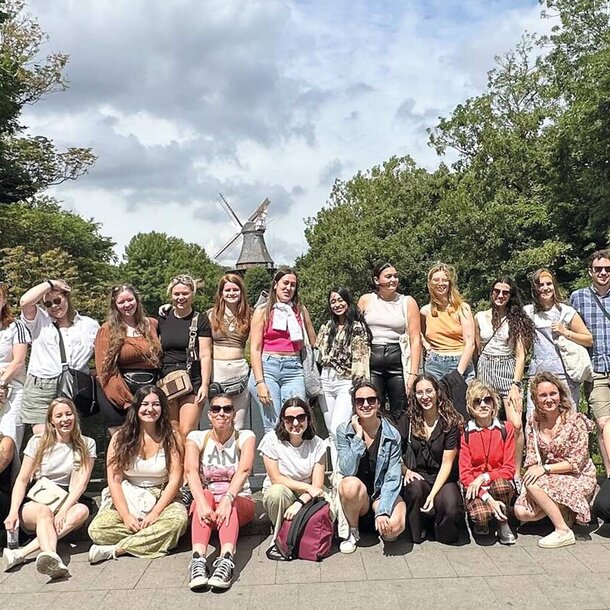By Tijana Funk/NA DAAD
Flexible, Interdisciplinary and Collaborative

Students and lecturers from the Blended Intensive Programme «Cultural and social well-being – identity and participation», which took place in Vechta in June 2023, on a day trip to Bremen.
The BIP work group was established in 2022 by Melanie Hochstätter (University of Konstanz) and Janina Heker (University of Mannheim). Over 80 members now meet at regular peer-to-peer exchange sessions. Further information and a contact option can be found here: BIP section of the NA DAAD website (German).
The aim of Blended Intensive Programmes is to facilitate short-term periods of study or training abroad as part of a collaboratively organised event. This action supports the development of collaborative short-term programmes that are ideally integrated into the curricula of participating universities. A defining feature of BIPs is their mandatory virtual component which includes preparatory support, assistance during the actual mobility and follow-up support after the short-term mobility experience.
Diverse programme enjoys growing popularity
The action is enjoying growing popularity. Firstly, this is reflected in the steadily growing interest in the BIP work group (BIP-AG), as confirmed by Melanie Hochstätter, department coordinator at the University of Konstanz and head of the work group. Secondly – and more importantly – this is proven by the BIPs themselves. German universities organised 174 BIPs between 2021 and 2023 using funds from the 2021 calls. Almost 2,000 funded individuals from other EU member states and third countries associated to the Programme took part in the programmes, while around 2,400 German students visited another country as part of a BIP.
Many universities are integrating these programmes into their internationalisation strategies and structural development plans. For instance, some universities have established BIPs as dedicated mobility windows within suitable courses, while others have formed smaller consortia which offer a BIP on a rotating basis. These may not be formally embedded in a curriculum, but they are regularly available for certain degree programmes.
Overall, Blended Intensive Programmes are used in a variety of ways and across all disciplines at German universities: from summer and winter schools to seminars already included in curricula, as well as completely new projects through which students can earn micro-credentials.
Increased workload for teachers
This highlights the importance of strong collaboration with partners not only during the planning phase but also in the programme’s evaluation. Melanie Hochstätter stresses that for BIPs to be strategically integrated into a university’s profile, it is imperative that the planning and teaching contributions of educators are officially recognised by the institution. «As we continue to develop the BIPs, considering this aspect is essential,» emphasises Hochstätter.
BIPs at the University of Vechta: benefits for teaching, learning and research
While many universities implement individual activities through BIPs, the University of Vechta has chosen to integrate them as a core component of its curriculum for the subjects social work and education. This decision is partly because Vechta is a small university in a rural area, with a focus on teacher training and social services. It also has a high percentage of first-generation academics among its students, which means that its student body is seen in many respects as less mobile.
BIPs offer the university a valuable opportunity to promote the internationalisation of its curricula, make global perspectives more prominent in its subjects and significantly increase student mobility. In addition, they help strengthen and intensify collaboration with international partners, further elevating the university’s profile. The EU’s 2022 recommendations on micro-credentials (European Approach to Micro-credentials) have also given BIPs a boost at policy level, bringing them to the attention of more faculty members.
Thanks to the enthusiasm and dedication of teaching staff, Vechta applied for 5 BIPs in 2021, 3 of which have taken place annually since then. While the faculties handle organisation of the BIPs, the International Office oversees administration and provides advisory services. These recurring Blended Intensive Programmes not only enhance the university’s partnership profile for students, they also create incentives for potential long-term mobilities.
Benefits for students and teachers
The evaluation of student reports has shown that students particularly appreciate the aspects of the programme highlighted in the EU Commission’s document published in July 2022 for national agencies and beneficiaries titled «Blended mobility implementation guide for Erasmus+ higher education mobility KA131». These aspects include collaboration in international (and interdisciplinary) groups, the flexible design and shorter duration of the in-person phase (5−30 days) and opportunities for international networking.
But it’s not only students who benefit from BIPs. Educators do too, says Magnus Frampton, who teaches social work and social pedagogy. «Professional and informal exchanges with participants of other European nationalities broaden our horizons and strengthen European identity. European values such as social justice and solidarity are also key values in my field. In this respect, BIPs are a win-win strategy.»
Tijana Funk/NA DAAD